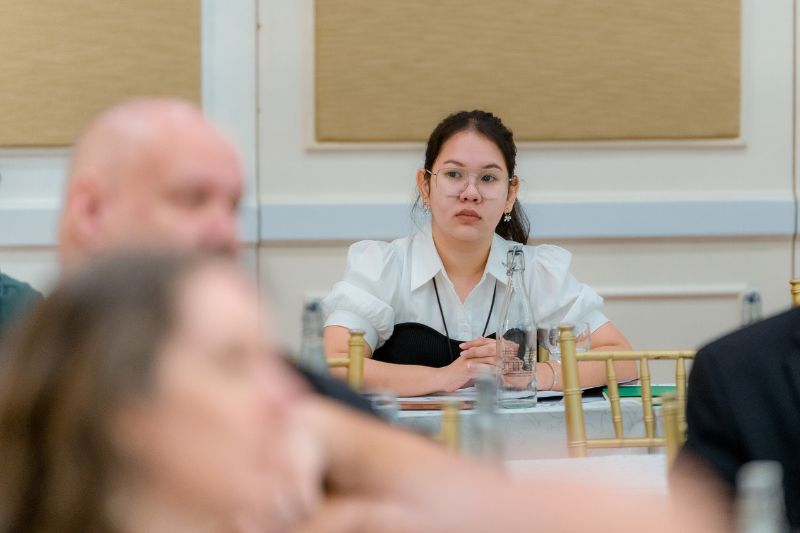
By Valeria Mendoza
Meet Keorimy Ouk, a passionate advocate for food safety in Cambodia. Originally from Phnom Penh, Cambodia, Keorimy is pursuing a master’s degree in Food Safety and Technology at the Royal University of Agriculture, while serving as a Program Officer at the Center of Excellence on Sustainable Agricultural Intensification and Nutrition (CE SAIN) and lead technician on a project funded by the Feed the Future Innovation Lab for Food Safety (FSIL). Through her research, Keorimy aims to understand the challenges posed by foodborne illnesses and help implement effective strategies to mitigate these risks, ultimately improving public health and raising food safety standards in Cambodia’s agricultural sector. We spoke with Keorimy to learn more about her research, career ambitions, and the connection between agricultural practices and food safety.
In your opinion, what barriers does Cambodia face in strengthening food safety?
In Cambodia, we’ve achieved considerable success in food security; there’s ample food available with good nutritional value. However, food safety is a relatively new concept here. It’s not just me: Many people view food safety as a non-essential issue. This mindset poses a significant challenge. There’s a general lack of awareness and interest in adhering to food safety policies and regulations. From my experience, raising awareness about food safety is crucial. I believe that if people start recognizing its importance, it could greatly reduce food-borne illnesses. Educating the public about food safety is essential for improving overall health and preventing diseases that can arise from unsafe food practices.
You take a supply chain approach to food safety research. How does that work?
Food safety is closely tied to agricultural practices, and improving agriculture can have a direct impact on enhancing food safety. In my research, I focus on understanding and mitigating contamination in agriculture, particularly in diverse farming systems. For the FSIL project, my interest primarily lies in assessing microbial contamination throughout various points in the produce supply chain. This involves collecting samples from farms, markets, and vendors to identify stages with the highest risk of microbial contamination. We aim to identify critical control points for microbial contamination throughout the entire supply chain, from farms to markets.
Prior pilot projects revealed high levels of E. coli and Salmonella in market-sold fish, prompting further investigation into each step of the supply chain. By identifying steps with high contamination, we can develop targeted interventions or technological solutions to mitigate these risks. For example, if farms are identified as common sources of contamination, we can introduce specific farm-level measures to address this issue. Similarly, if markets are found to have high contamination levels, we can implement strategies to prevent it at that stage. This comprehensive approach is vital for enhancing food safety and public health in Cambodia.
What have you learned so far about food safety in traditional farming systems?
This aspect of my research is not just academically fascinating but also vital for improving food safety standards in our region. Here, traditional farming practices often involve integrating crops with livestock. My goal is to understand how different farming methods impact the level of microbial contamination. For instance, when crops are combined with livestock farming, there’s a risk of cross-contamination from environmental factors, such as bacteria like E. coli or Salmonella. It’s crucial for farmers to implement measures to prevent this, such as separating crops and livestock and ensuring rigorous hygiene practices. For farms that have produce and livestock, my key recommendation is to minimize cross-contamination by keeping livestock away from areas where produce is grown and ensuring that equipment is cleaned thoroughly if used in both settings. This approach is aimed at reducing foodborne contamination at the farm level.
What are your career aspirations?
At the moment, I haven’t made any concrete plans for my research after completing my master’s degree. I am excited to be taking on a new opportunity as a Program Officer at CE SAIN. While this position may not be directly related to food safety in Cambodia, it presents an excellent opportunity for me to contribute to the development of the new generation in the field of agriculture. I will have the chance to work with students and engage them in various aspects of agriculture, ranging from crop cultivation and fish farming to food science and animal science. My goal is to encourage and empower young people to pursue careers in agriculture and play a role in increasing food production and improving our nation’s food security. I sincerely hope to serve as an inspiration for the younger generation, encouraging them to pursue studies in agriculture. My aim is to instill in them the enthusiasm to actively contribute to the enhancement of agriculture in Cambodia, with a particular focus on ensuring food safety.
What has been notable about your research with FSIL?
My project team was incredibly supportive. Whenever I encountered any issues, whether they were resource-related or technical, the team provided comprehensive assistance. They offered complete support in terms of technical resources and funding. This level of support was invaluable to the success of my research. Dr. Jessie [Vipham], Dr. Paul [Ebner], and others consistently offered me extensive guidance and numerous opportunities, especially vital in a setting like Cambodia where resources can be limited. Their guidance was crucial in navigating the unique challenges of the region. They also provided a wealth of training, including in laboratory skills, statistics, and manuscript writing. I consider myself very fortunate to have their comprehensive support, which has significantly enriched my experience and learning.
Valeria Mendoza is a program assistant with the Feed the Future Innovation Lab for Food Safety and is pursuing a degree in Food Science at Purdue University.

